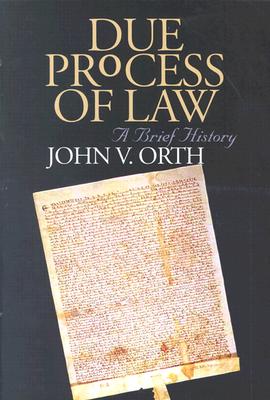Due Process of Law: A Brief History

Due Process of Law: A Brief History
Many rights that Americans cherish today go unmentioned in the U.S. Constitution. Where do these freedoms come from? John V. Orth answers that question in this unique and gem-like history of due process. No person's life, liberty, or property may be taken without "due process of law." What exactly that means has been one of the most frequently asked questions in American constitutional history. Today, the answer is usually given in two parts: what procedures the government must follow and--in exceptional cases--what the government cannot do even if it follows the proper procedures. The procedural aspect of this answer has been far less controversial than "substantive due process," which at one time limited government regulation of business and today forbids the states from outlawing abortions. "Due process of law," as a phrase and as a concept, was already old at the time it was adopted by American constitution-writers, both state and federal. Mindful of the English background and of constitutional developments in the several states, Orth in a succinct and readable narrative traces the history of due process, from its origins in medieval England to its applications in the latest cases. Departing from the usual approach to American constitutional law, Orth places the history of due process in the larger context of the common law. To a degree not always appreciated today, constitutional law advances in the same case-by-case manner as other legal rules. In that light, Orth concentrates on the general maxims or paradigms that guided the judges in their decisions of specific cases. Uncovering the links between one case and another, Orth describes how a commitment to fair procedures made way for an emphasis on the protection of property rights, which in turn led to a heightened sensitivity to individual rights in general. This unconventional history of the concept of due process heightens the reader's understanding of an important and vexed question of Anglo-American law and constitutionalism. Tracing the evolution of substantive due process through paradigmatic and exemplary cases, Orth explains in understandable terms the sources of controversial judicial rulings like Roe v. Wade.
PRP: 166.94 Lei
Acesta este Pretul Recomandat de Producator. Pretul de vanzare al produsului este afisat mai jos.
150.25Lei
150.25Lei
166.94 LeiLivrare in 2-4 saptamani
Descrierea produsului
Many rights that Americans cherish today go unmentioned in the U.S. Constitution. Where do these freedoms come from? John V. Orth answers that question in this unique and gem-like history of due process. No person's life, liberty, or property may be taken without "due process of law." What exactly that means has been one of the most frequently asked questions in American constitutional history. Today, the answer is usually given in two parts: what procedures the government must follow and--in exceptional cases--what the government cannot do even if it follows the proper procedures. The procedural aspect of this answer has been far less controversial than "substantive due process," which at one time limited government regulation of business and today forbids the states from outlawing abortions. "Due process of law," as a phrase and as a concept, was already old at the time it was adopted by American constitution-writers, both state and federal. Mindful of the English background and of constitutional developments in the several states, Orth in a succinct and readable narrative traces the history of due process, from its origins in medieval England to its applications in the latest cases. Departing from the usual approach to American constitutional law, Orth places the history of due process in the larger context of the common law. To a degree not always appreciated today, constitutional law advances in the same case-by-case manner as other legal rules. In that light, Orth concentrates on the general maxims or paradigms that guided the judges in their decisions of specific cases. Uncovering the links between one case and another, Orth describes how a commitment to fair procedures made way for an emphasis on the protection of property rights, which in turn led to a heightened sensitivity to individual rights in general. This unconventional history of the concept of due process heightens the reader's understanding of an important and vexed question of Anglo-American law and constitutionalism. Tracing the evolution of substantive due process through paradigmatic and exemplary cases, Orth explains in understandable terms the sources of controversial judicial rulings like Roe v. Wade.
Detaliile produsului








